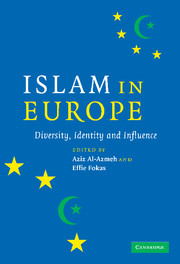Book contents
- Frontmatter
- Contents
- List of figures
- List of contributors
- List of abbreviations
- Preface
- 1 Introduction
- 2 Christians and Muslims: memory, amity and enmities
- 3 The question of Euro-Islam: restriction or opportunity?
- 4 Muslim identities in Europe: the snare of exceptionalism
- 5 From exile to diaspora: the development of transnational Islam in Europe
- 6 Bosnian Islam as ‘European Islam’: limits and shifts of a concept
- 7 Islam in the European Commission's system of regulation of religion
- 8 Development, discrimination and reverse discrimination: effects of EU integration and regional change on the Muslims of Southeast Europe
- 9 Breaching the infernal cycle? Turkey, the European Union and religion
- 10 Afterword
- Index
- References
2 - Christians and Muslims: memory, amity and enmities
Published online by Cambridge University Press: 05 June 2012
- Frontmatter
- Contents
- List of figures
- List of contributors
- List of abbreviations
- Preface
- 1 Introduction
- 2 Christians and Muslims: memory, amity and enmities
- 3 The question of Euro-Islam: restriction or opportunity?
- 4 Muslim identities in Europe: the snare of exceptionalism
- 5 From exile to diaspora: the development of transnational Islam in Europe
- 6 Bosnian Islam as ‘European Islam’: limits and shifts of a concept
- 7 Islam in the European Commission's system of regulation of religion
- 8 Development, discrimination and reverse discrimination: effects of EU integration and regional change on the Muslims of Southeast Europe
- 9 Breaching the infernal cycle? Turkey, the European Union and religion
- 10 Afterword
- Index
- References
Summary
In today's world, the waves of economic, technological and ecological forces at work favour integration and uniformity. Increasingly, we are all tied together by communications, information systems, commerce and entertainment. Images and perceptions gain an unprecedented role in shaping realities: ‘he who screens history can make history’.
Many structures of governance have become much less able to address major problems and take major decisions. Within this context, the exercise of power within the limits of a national territory is weakened substantially. But national governments have become, at the same time, too complex to deal with small problems. One need not give examples of the many existing nations that are considered unsuitable for accommodating all those who would have liked to live together, or unstable as they impose an undesired coexistence on religious communities and ethnic groups.
The awakening of nationalism and the rift in nations are concomitant. In many situations, we see the logic of economy favouring interdependence and regional integration while that of politics seems to follow the path of national fragmentation. An interpretation widespread in the West, based on a primordialist understanding of the nation, considers nationalism to be an archaism, something like a return of history. At best, it is a late and disordered construction that is still thought to be the way of access, in many societies, to modernity. Politicians evoke a world to be ruled by the universal principles of market economy, democracy and human rights, but which is threatened by ‘ancestral hatred’.
- Type
- Chapter
- Information
- Islam in EuropeDiversity, Identity and Influence, pp. 16 - 33Publisher: Cambridge University PressPrint publication year: 2007
References
- 1
- Cited by

